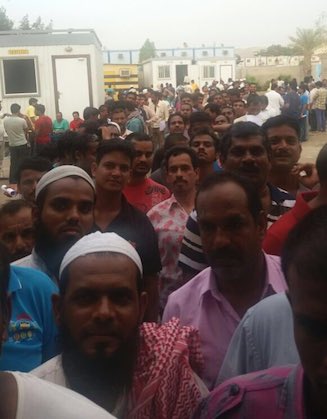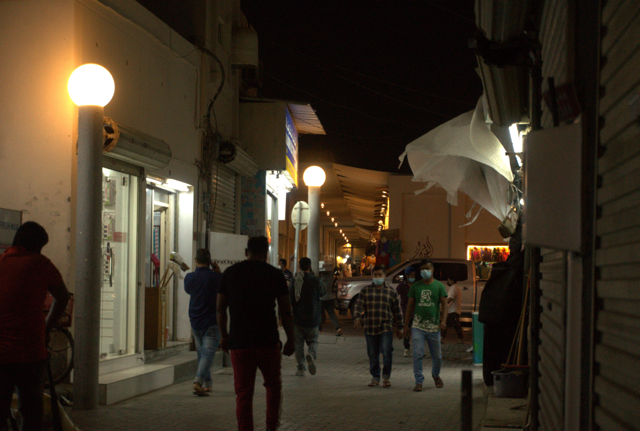Victims of Saudi financial crisis see no reprieve even after months of suffering

In the Churu city of Rajasthan, India, a family of 10 is desperately worried. Six years ago, Yousuf Ali*, the third of eight siblings, took a loan to leave for Riyadh to work as part of Empower Contracting, a subsidiary of the construction business Saudi Binladen Group. The dream to support his family did not last long. His concerns started mounting as workers went on a strike in February 2016 over non-payment of wages. The last salary Ali received was a year ago. “I have seven months of salary due. Not to mention six months of waiting for it since then,” says Ali.
Around 400 miles west of Rajasthan in Rawalpindi, Pakistan, Masood Ahmed* battles anxiety. His family struggle to make ends meet. “Many a time we don’t have items of daily use in the house. Sickness is a part of our life these days,” shares Masood, Ahmed’s brother.
Ahmed has a wife and a school-going daughter studying in fourth grade. “I pay her school fee at times. One time, he (Ahmed) arranged for a loan from a brother in Bahrain. They all seem to be in the same position though,” Masood says. “We think about him and it worries us. We get by somehow but we keep thinking about him. Does he have anything to eat? How is he surviving without any money?” he says.
We have been left to die here. No one listens to us”
Ahmed and Ali were originally part of a group of 300 workers from India, Pakistan and the Philippines waiting in Riyadh for their salary settlements. Even though the Bin Laden group shut down only in May 2017, salaries have been pending since 2016, and some have even been waiting for their dues to be cleared for 11 months.
“Our situation has been worse than animals. Many stories have been done about us and yet the situation does not improve,” says Ahmed.
It was only the threat of being held responsible for Ahmed’s death that mobilised the Empower management to get him treated. Ahmed had been writhing in pain due to appendicitis for weeks. His health insurance had expired and he had no means to bear the treatment expenses. Around the same time, Ahmed received bad news from his home in Rawalpindi, Pakistan. His father had passed away. “I felt so helpless. I had no money. My iqama (resident permit) had expired. I could not make a trip and see my father for the last time.” Nor could Ahmad send any money.
Until the filing of this story, the management has cleared salaries of all but 34 workers, out of which 31 are from India and the remaining three are Pakistanis. CEO, Empower Contracting, Osama Arafat and the administrative staff of the company declined to comment on the situation despite multiple attempts over the last one month.
In March this year, Saudi Arabia introduced an amnesty under which undocumented migrant workers could return to their country of origin without penalty. The campaign, originally set to expire in July was extended to November 15.
Ahmed has received his settlement yet still struggles to exit Saudi Arabia.
“What’s the point of this amnesty when it comes with its own limitations?” says a Pakistani worker
“We are told that iqamas expired before March 19 can benefit from this amnesty. Mine expired on March 27.” Ahmed says he has been meeting Saudi agents who have been demanding RO1,000-1,500 to process his exit. “I told them I do not have this much money. I then sent my passport and visa to our company in Jeddah. I’m hopeful that I will leave for Pakistan in a few days.”
Our situation has been worse than animals. Many stories have been done about us and yet the situation does not improve”
While Ahmed is holding on to hope, Ali finds himself to be only waiting. “We have appealed twice to the management of Empower since the last 140 workers received their salaries. Time and again we are told that we will be cleared once the government releases funds. The day just does not come for us,” he says. A group of 108 of these workers had filed two cases in labour court in June 2017. Soon after this, the management started clearing salaries list by list. As of now, all Filipinos have been cleared while 34, including Indian and Pakistani workers are still waiting
Hired as a ‘camp boss’ to look after fellow workers and aid in day-to-day chores inside the camp, Ali says he had been on call 24 hours a day in the camp. “I was paid for an eight-hour shift and any additional overtime I did.” Ali earned RO2,400 ($640) a month and has not sent any money for the past one year. “I have not been paid for seven months and for any overtime since 2016. Ali’s iqama is valid but he has been waiting for health insurance for over five months. “I can’t process what may happen. If I fall sick, where will I go?” he questions.
Ali is severely indebted. His family in Rajasthan has taken more loans to survive. “I have not been sending any money back home for the past one year. They took another loan to meet the household expenses. I just want to go back, ground my feet and work towards paying them off.”
Tens of thousands of migrant workers were laid off in Saudi Arabia without having been paid for months after the government cut spending on contracts with construction and other companies. “Indian, Pakistani, Filipino and other foreign nationals were left stranded without food, water or exit visas; some took to the streets to block roads in protest,” says the report, ‘The State Of The World’s Human Rights.’
Azeem Khan*, a resident of Bagh district Kashmir, was among the lucky few who returned before the company went bankrupt. He came back in March this year, when, according to him, trouble for workers was building up. “I have been very disappointed with the overall response of the management there. The agreements you sign with the management are rarely followed by them,” he said.
Pakistani workers also complain of lack of support from their embassy. “A few months ago our embassy told us that you will get money from the welfare fund. They took our signatures and called us to tell that they’ll be coming soon to offer some funds. We told them yes we are always in our camp in Haris ul Watni but they never turned up,” complain the workers.
“For my case, I recently went to the embassy again that I have been cleared and need an exit permit and they told me they can’t do anything about it. At least other embassies come to camps and talked to their people. Some even served their people iftar in Ramadan. We have been left to die here. No one listens to us,” says Ahmed.
Senior Programme Coordinator, International Organisation for Migration, Junaid Khan says that they only reach out in an emergency situation when it is something that the embassy cannot do. “In KSA, workers get into contracts they are not aware of. We have reached out to the government for this. Request for help and evacuation has to come through the country of origin of workers,” he said.
*Names have been changed to protect privacy of sources
The article is part of Panos South Asia Fellowship 2017-18 to cover migrant labour




